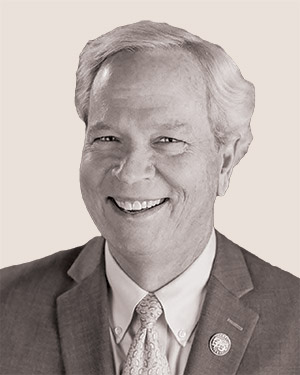
Related Article:
Jackson, Miss., Sewers Added to Special Manager's Mission
Back to:
25 Top Newsmakers
Edward “Ted” Henifin was comfortably retired in August 2022, when one of America's worst infrastructure crises hit Jackson, Miss., the state capital.
Little did the reserved engineer know as he watched TV images of residents waiting in long lines and going days without water that he would be the one to oversee the massive multibillion-dollar effort to finally bring the city’s aging and long-neglected water and wastewater systems into the 21st century.
But Henifin has been the right person to lead the arduous task of returning crippled and even non-existent water service to more than 160,000 people. As the former manager of Virginia’s Hampton Roads Sanitation District, he knew the details of system infrastructure, processes and management.
Initially, Henifin was appointed interim third-party manager of JXN Water, Jackson’s drinking water utilty, as part of an agreement between federal, state, and local officials tasked with bringing the century-old city system up to date. He later was appointed to oversee its wastewater treatment operations as well.
Henifin and his team have made key progress in the rehabilitation—plugging more than 5,000 leaks in city water supply lines that lost an estimated 5 million gallons per day, and repairing more than 200 leaks in the city wastewater treatment system. He also oversaw repairs to its two massive water treatment plants, including one that is nearly a century old.
Henifin monitored all aspects of the upgrades—from nuts and bolts to massive 48-in. pipe installation.
Technology has also played a part in rehabbing the water system. More than 61,000 new water meters have been installed. “We are getting better meter reading than ever before,” Henifin says.
Soft-spoken and self-effacing, Henifin says rehabilitating the woeful system is hardly a one-man effort. Many local, state and federal agencies are providing assistance to develop and fund needed solutions. He told ENR that with the new attention, Jackson is also moving water department finances from deep in the red to back to black.
Before the crisis hit, approximately half of water system customers were not paying bills for services. Now, more than 80% are. He attributes the payments to utility personnel being more visible and responsive. “The people of Jackson are seeing work crews fixing the lines, fixing the leaks,” he says.
The water situation in Jackson was labeled a crisis when the area was without water for weeks. That could reflect the nation’s water infrastructure as a whole, he says. “Water is an undervalued resource,” Henifin emphasizes. One problem with the U.S. water infrastructure system is that repairs and upgrades are often placed on the backburner for other projects, he says.
But Henifin also makes it clear that water bills must be more equitable for city users. One solution he has pitched is structuring water bills based on the value of a customer’s residence. The higher the value of the home, the higher the water services charge.
However, state legislature members passed legislation to bar the new rate system from going into effect when they heard about his idea.
Even so, Henifin says he wants to remain on the job for another few years to see the effort completed. “The federal wastewater decree ends in September 2027; I’d like to stay at least until then.”
All ENR 2023 Top 25 Newsmakers will be honored at the Award of Excellence Gala on April 11 in New York City.






Post a comment to this article
Report Abusive Comment